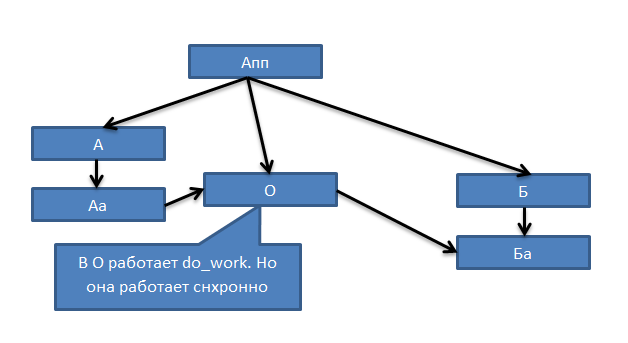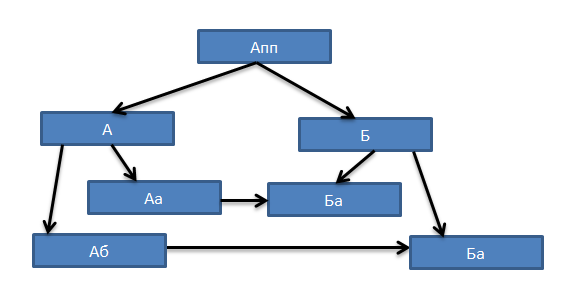 итеряетяс весь смысл создания воркеров у Б, так как процесс всё-равно будет идти синхронно. Пример того, что должно получаться на картинке:
итеряетяс весь смысл создания воркеров у Б, так как процесс всё-равно будет идти синхронно. Пример того, что должно получаться на картинке: при этом не важно как идут запросы, через Б или через промежуточный менеджер процессов О, главное, чтобы никто никого не ждал, кроме обращающегося к воркеру процесса.
при этом не важно как идут запросы, через Б или через промежуточный менеджер процессов О, главное, чтобы никто никого не ждал, кроме обращающегося к воркеру процесса. 2147144708:error:06065064:digital envelope routines:EVP_DecryptFinal_ex:bad decrypt:evp_enc.c:539:И
e_param->data_len = chph.size()-1;
тоже какая-то хрень. Зачем тут -1 ?
Вы нигде не используете len который вам возвращает EVP_EncryptUpdate
и почему-то считаете, что с out_buffer можно обращаться как с C-строкой (что неверно)
ты тут не докопировал или как? должно быть -lcrypto вроде.
$ g++ function.cpp main.cpp -o my_openssl_use -I/usr/local/ssl/include/openssl/ -L/usr/local/ssl/lib/ -lssl -lcryptog++ -I/usr/local/ssl/include/openssl/ -L/usr/local/ssl/lib/ -lssl -lcrypto -c -g -Wall -MMD -MP -MF "build/Debug/Cygwin_4.x-Windows/function.o.d" -o build/Debug/Cygwin_4.x-Windows/function.o function.cpp
mkdir -p build/Debug/Cygwin_4.x-Windows
rm -f "build/Debug/Cygwin_4.x-Windows/main.o.d"
g++ -I/usr/local/ssl/include/openssl/ -L/usr/local/ssl/lib/ -lssl -lcrypto -c -g -Wall -MMD -MP -MF "build/Debug/Cygwin_4.x-Windows/main.o.d" -o build/Debug/Cygwin_4.x-Windows/main.o main.cpp
mkdir -p dist/Debug/Cygwin_4.x-Windows
g++ -I/usr/local/ssl/include/openssl/ -L/usr/local/ssl/lib/ -lssl -lcrypto -o dist/Debug/Cygwin_4.x-Windows/encript build/Debug/Cygwin_4.x-Windows/function.o build/Debug/Cygwin_4.x-Windows/main.o
build/Debug/Cygwin_4.x-Windows/function.o: In function `Z14encript_scringRSs':
function.cpp:36: undefined reference to `ERR_load_crypto_strings'
function.cpp:37: undefined reference to `OPENSSL_add_all_algorithms_noconf'
function.cpp:38: undefined reference to `OPENSSL_config'
function.cpp:46: undefined reference to `BIO_dump_fp'
function.cpp:60: undefined reference to `EVP_cleanup'
function.cpp:61: undefined reference to `ERR_free_strings'
>Адрес такой указан в настройках ЧПУ
1. отключите .htaccess и посмотрите, что будет.
2. попробуйте сделать простой скрипт, который будет вам что-то отдавать (хоть "echo 123;") и
попробуйте приконектиться к нему сначала из соапа (должен упасть с ошибкой разбора xml)
получить информацию с помощью curl
получить информацию wget